形容词比较级及常用句式
形容词与副词比较级和最高级的重点句型归纳

形容词与副词比较级和最高级的重点句型归纳表示两者(人或物)比较时,相比较的对象应是同类事物,不同类的事物无法比较,我们常用以下句型:⑴A>B或A<B(…比较级+than…)This room is smaller than that one.This story is more interesting than that one.⑵ A=B(…as+原级+as…)This cake is as big as that one.Swimming is as exciting as climbing.⑶ A≠ B (① not as/so+原级+as… 与……不一样,②more+原级… 超过……)Jim is not as/so tall as Li Lei.John is more hard-working than Joan.English is more useful than Japanese.= Japanese is not so/as useful as English.⑷表示程度的递增(-er+-er或者more and more +多音节的形容词原级,越来越……)When winter comes, the days get colder and colder. My hometown is becoming more and more beautiful. (5)表示两种情况同时变化。
(the+比较级…, the+比较级越来越……)The busier she is, the happier she feels.The less she worried, the better she worked.The more we get together, the happier we’ll be. (6)A>B>C… (…the+形容词或副词的最高级+in/of/among+比较范围…,最……)He is the tallest of the three.(of表示所有关系时,介词后的词与主语同类。
初中英语知识点:比较级和最高级 + 代词
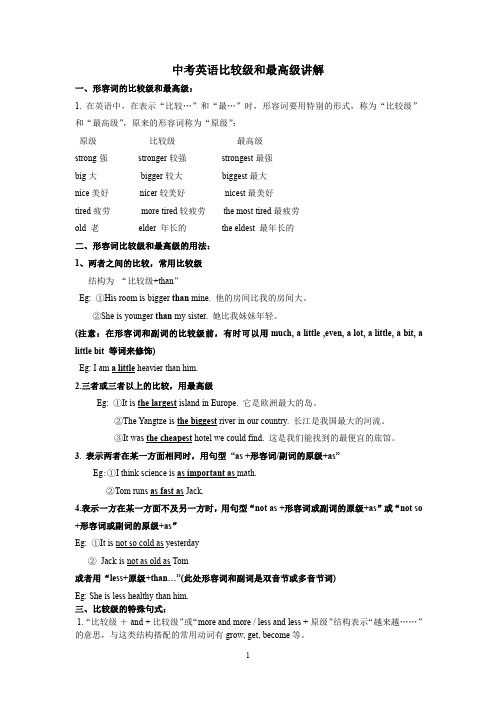
中考英语比较级和最高级讲解一、形容词的比较级和最高级:1.在英语中,在表示“比较…”和“最…”时,形容词要用特别的形式,称为“比较级”和“最高级”,原来的形容词称为“原级”:原级比较级最高级strong强stronger较强strongest最强big大bigger较大biggest最大nice美好nicer较美好nicest最美好tired疲劳more tired较疲劳the most tired最疲劳old老elder年长的the eldest最年长的二、形容词比较级和最高级的用法:1、两者之间的比较,常用比较级结构为“比较级+than”Eg:①His room is bigger than mine.他的房间比我的房间大。
②She is younger than my sister.她比我妹妹年轻。
(注意:在形容词和副词的比较级前,有时可以用much,a little,even,a lot,a little,a bit,a little bit等词来修饰)Eg:I am a little heavier than him.2.三者或三者以上的比较,用最高级Eg:①It is the largest island in Europe.它是欧洲最大的岛。
②The Yangtze is the biggest river in our country.长江是我国最大的河流。
③It was the cheapest hotel we could find.这是我们能找到的最便宜的旅馆。
3.表示两者在某一方面相同时,用句型“as+形容词/副词的原级+as”Eg:①I think science is as important as math.②Tom runs as fast as Jack.4.表示一方在某一方面不及另一方时,用句型“not as+形容词或副词的原级+as”或“not so +形容词或副词的原级+as”Eg:①It is not so cold as yesterday②Jack is not as old as Tom或者用“less+原级+than…”(此处形容词和副词是双音节或多音节词)Eg:She is less healthy than him.三、比较级的特殊句式:1.“比较级+and+比较级”或“more and more/less and less+原级”结构表示“越来越……”的意思,与这类结构搭配的常用动词有grow,get,become等。
比较级,时态,句子
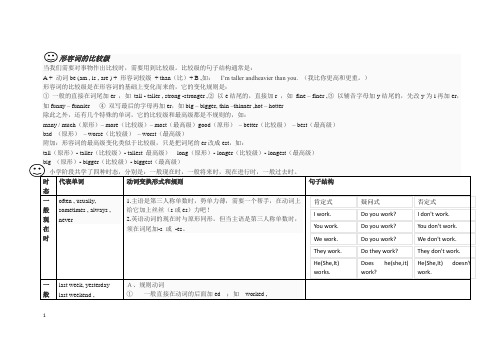
1233、一般疑问句:是指询问事实的句子,此类句子必须用“yes”,或“no”来回答。
如:Are you astudent? Yes, I am / No, I’m not.Is she a doctor? Yes, sheis. / No, she isn’t.Does he work in a hospital? Yes, he does./ No, he doesn’t.Are there four fans in our classroom? Yes, there are. / No, there aren’t.Did you watch TV yesterday evening? Yes, I did. / No, I didn’t.☆小结:一般疑问句是在肯定句的基础上,①把动词be调到首位,其他照写,末尾标点符号变成问号即可。
②没有动词be的句子则要在句首加上一个助动词(do,does,did)再把紧跟在后面的动词变回原形,末尾标点符号变成问号即可。
这三个助动词也要根据人称和时态来选择,其中“does”只用于一般现在时主语是第三人称单数的情况,而“did”只用于一般过去时,不论主语是什么人称和数,都用“did” 。
一般疑问句有个重要的原则就是问和答要一致,即问句里的第一个单词(助动词)和简略答句里的这个词是一致的。
4、特殊疑问句:以特殊疑问词(what , where , who , which , when , whose , why ,how等)开头引导的句子。
此类句子应该问什么就答什么,不能用“yes 、no”来回答。
如:What is this?It’s a computer.What does he do?He’s a doctor.Where ar e yougoing? I’m going to Beijing.Who played football with you yesterday afternoon? Mike.Which seasondo you like best? Summer. When do youusually get up? I usually get up at 6:30.Whose skirt isthis? It’s Amy’s.Why do you likespring best? Because I can plant trees.How are you?I’m fine. / I’m happy. How did you go to Xinjiang?I went to Xinjiang by train.☆其中how又可以和其他一些形容词连用组成特殊疑问词组用来提问,如:how many(多少(数量)), how much(多少(钱)), how tall(多高), how long (多长), how big(多大), how heavy(多重)例句:How many pencils do youhave? I have three pencils.How many girls can yousee? I can see four girls.How many desks are therein your classroom? There are 51.☆小结:how many 用来提问可数名词的数量,主要有以上三种句式搭配,How many + 名词复数+ do you have? 你有多少……?How many + 名词复数+ can you see? 你能看见多少……?How many + 名词复数+ are there…?有多少……?4。
英语形容词比较级讲义

英语形容词比较级讲义-CAL-FENGHAI.-(YICAI)-Company One1英语形容词比较级总结归纳L.J. 9.28 Actions speak louder than words.事实胜于雄辩。
(一) 英语形容词比较级的构成英语形容词比较等级有三个:原级,比较级和最高级。
形容词比较等级形式变化有规则的和不规则的两种。
规则变化1)单音节词末尾加-er(比较级),-est(最高级)【例】原级比较级最高级great greater greatest small smaller smallest clean cleaner cleanestquiet quieter quietest few fewer fewest young younger youngest2)单音节如以e结尾,只加-r(比较级),-st(最高级)【例】 fine finer finest nice nicer nicest wide wider widest3)闭音节单音节词如末尾只有一个辅音字母,(辅音﹢元音﹢辅音【w,r除外】)须先双写这个辅音字母,再加-er(比较级),-est(最高级)【口诀:大红辣椒潮湿瘦变胖】big bigger biggest hot hotter hottest red redder reddestfat fatter fattest thin thinner thinnest we t wetter wettest4)辅音字母加y结尾的词,则变y为-i,再加-er和-est。
【例】easy easier easiest healthy healthier healthiest sunny sunnier sunniest5)其它双音节和多音节词皆在前面加单词more和most。
【例】 careful more careful most carefuldifficult more difficult most difficultdelicious more delicious most delicioustired more tired most tired6)不规则变化原级比较级最高级good/ well → better best bad → worse worstmany/ much → more most little → less leastfar → farther/further farthest/furthest注:有些形容词一般没有比较等级。
形容词副词的比较级最高级用法,并用例句解释说明。
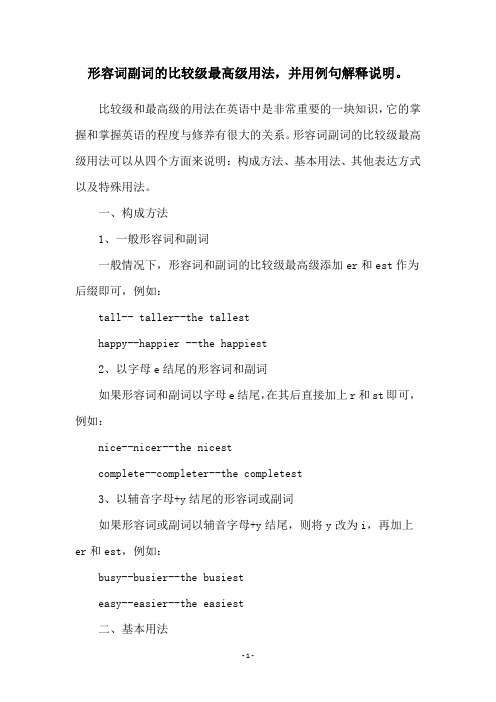
形容词副词的比较级最高级用法,并用例句解释说明。
比较级和最高级的用法在英语中是非常重要的一块知识,它的掌握和掌握英语的程度与修养有很大的关系。
形容词副词的比较级最高级用法可以从四个方面来说明:构成方法、基本用法、其他表达方式以及特殊用法。
一、构成方法1、一般形容词和副词一般情况下,形容词和副词的比较级最高级添加er和est作为后缀即可,例如:tall-- taller--the tallesthappy--happier --the happiest2、以字母e结尾的形容词和副词如果形容词和副词以字母e结尾,在其后直接加上r和st即可,例如:nice--nicer--the nicestcomplete--completer--the completest3、以辅音字母+y结尾的形容词或副词如果形容词或副词以辅音字母+y结尾,则将y改为i,再加上er和est,例如:busy--busier--the busiesteasy--easier--the easiest二、基本用法1、比较级用法比较级构成“比…更…”的句式,可以表示两个对象或人之间的对比比较,常用的连接词有than,例如:This pen is much nicer than that one.2、最高级用法最高级常用于表示“三者或以上的比较”,若要表示一类事物中最“最…”的,也可以使用最高级,此时可以用of短语,例如:She is the happiest of all.三、其他表达方式除了以上提到的基本用法,还可以使用下列比较级和最高级表达方式:1、形容词+than+any otherThis bag is bigger than any other.2、the+原级+of all/in the worldHe is the oldest of all in the world.3、the+比较级+everThis is the tallest building ever.四、特殊用法1、表示最…的时候,有时可以不使用最高级This park is the nicest one in the city.2、在形容词和副词中有一些特殊的词,它们不能按常规规律构成比较级最高级,而是有特殊的变化形式,例如:good--better--the bestbad--worse--the worst总之,掌握形容词副词的比较级最高级用法是很重要的,它与语言的精准度和级别有着重要的关系。
形容词与副词比较级重点句型归纳
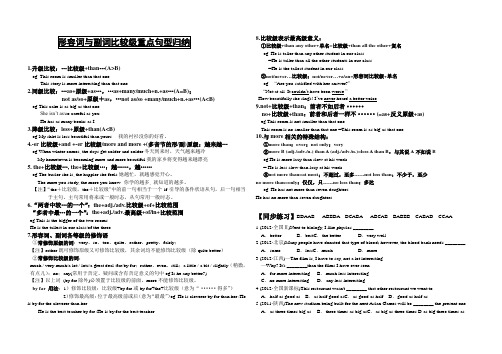
1.升级比较:…比较级+than…(A>B)eg. This room is smaller than that one.This story is more interesting than that one.2.同级比较:…as+原级+as…,…as+many/much+n.+as…(A=B);not as/so+原级+as,…not as/so +many/much+n.+as…(A<B)eg.This cake is as big as that one.She isn’t as/so careful as you.He has as many books as I.3.降级比较:less+原级+than(A<B)eg.My shirt is less beautiful than yours. 我的衬衫没你的好看。
4.-er比较级+and +-er比较级/more and more +(多音节的形/副)原级:越来越…eg.When winter comes, the days get colder and colder.冬天到来时,天气越来越冷My hometown is becoming more and more beautiful.我的家乡将变得越来越漂亮5. the+比较级…, the+比较级…:越……,越……eg.The busier she is, the happier she feels.她越忙,就越感觉开心。
The more you study, the more you know. 你学的越多, 就知道的越多。
【注】“the+比较级,the+比较级”中的前一句相当于一个if引导的条件状语从句,后一句相当于主句。
主句常用将来或一般时态,从句常用一般时态。
6.“两者中较…的一个”:the+adj./adv.比较级+of+比较范围“多者中最…的一个”:the+adj./adv.最高级+of/in+比较范围eg.This is the bigger of the two rooms.He is the tallest in our class/of the three.7.形容词、副词各等级的修饰语①常修饰原级的词:very、so、too、quite、rather、pretty、fairly;【注】rather既可修饰原级又可修饰比较级,其余词均不能修饰比较级(除quite better)②常修饰比较级的词:much / very much/a lot / lots/a great deal /far/by far;rather、even、still;a little / a bit / slightly(稍微,有点儿);no;any(常用于否定、疑问或含有否定意义的句中eg.Is he any better?)【注】以上词(by far除外)必须置于比较级的前面。
初中英语知识点:比较级和最高级 + 代词

中考英语比较级和最高级讲解一、形容词的比较级和最高级:1.在英语中,在表示“比较…”和“最…”时,形容词要用特别的形式,称为“比较级”和“最高级”,原来的形容词称为“原级”:原级比较级最高级strong强stronger较强strongest最强big大bigger较大biggest最大nice美好nicer较美好nicest最美好tired疲劳more tired较疲劳the most tired最疲劳old老elder年长的the eldest最年长的二、形容词比较级和最高级的用法:1、两者之间的比较,常用比较级结构为“比较级+than”Eg:①His room is bigger than mine.他的房间比我的房间大。
②She is younger than my sister.她比我妹妹年轻。
(注意:在形容词和副词的比较级前,有时可以用much,a little,even,a lot,a little,a bit,a little bit等词来修饰)Eg:I am a little heavier than him.2.三者或三者以上的比较,用最高级Eg:①It is the largest island in Europe.它是欧洲最大的岛。
②The Yangtze is the biggest river in our country.长江是我国最大的河流。
③It was the cheapest hotel we could find.这是我们能找到的最便宜的旅馆。
3.表示两者在某一方面相同时,用句型“as+形容词/副词的原级+as”Eg:①I think science is as important as math.②Tom runs as fast as Jack.4.表示一方在某一方面不及另一方时,用句型“not as+形容词或副词的原级+as”或“not so +形容词或副词的原级+as”Eg:①It is not so cold as yesterday②Jack is not as old as Tom或者用“less+原级+than…”(此处形容词和副词是双音节或多音节词)Eg:She is less healthy than him.三、比较级的特殊句式:1.“比较级+and+比较级”或“more and more/less and less+原级”结构表示“越来越……”的意思,与这类结构搭配的常用动词有grow,get,become等。
形容词和副词比较等级用法
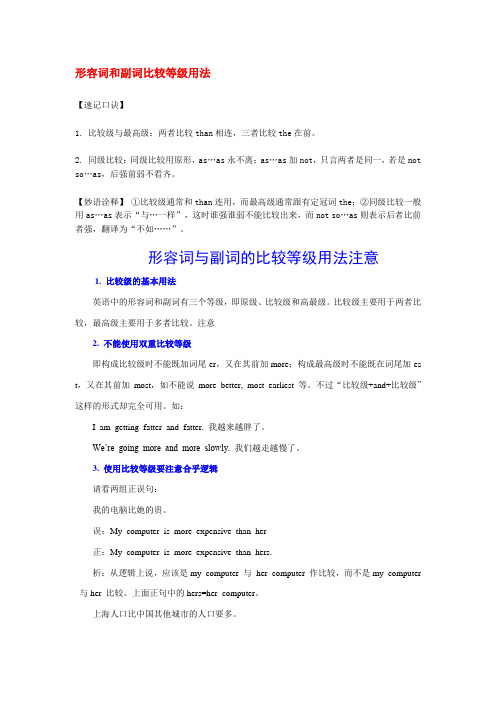
形容词和副词比较等级用法【速记口诀】1. 比较级与最高级:两者比较than相连,三者比较the在前。
2. 同级比较:同级比较用原形,as…as永不离;as…as加not,只言两者是同一,若是not so…as,后强前弱不看齐。
【妙语诠释】①比较级通常和than连用,而最高级通常跟有定冠词the;②同级比较一般用as…as表示“与…一样”,这时谁强谁弱不能比较出来,而not so…as则表示后者比前者强,翻译为“不如……”。
形容词与副词的比较等级用法注意1. 比较级的基本用法英语中的形容词和副词有三个等级,即原级、比较级和高最级。
比较级主要用于两者比较,最高级主要用于多者比较。
注意2. 不能使用双重比较等级即构成比较级时不能既加词尾-er,又在其前加more;构成最高级时不能既在词尾加-es t,又在其前加most,如不能说more better, most earliest 等。
不过“比较级+and+比较级”这样的形式却完全可用。
如:I am getting fatter and fatter. 我越来越胖了。
We’re going more and more slowly. 我们越走越慢了。
3. 使用比较等级要注意合乎逻辑请看两组正误句:我的电脑比她的贵。
误:My computer is more expensive than her正:My computer is more expensive than hers.析:从逻辑上说,应该是my computer 与her computer 作比较,而不是my computer 与her 比较。
上面正句中的hers=her computer。
上海人口比中国其他城市的人口要多。
误:The population of Shanghai is larger than that of any city in China.正:The population of Shanghai is larger than that of any other city in China.析:从逻辑上说,Shanghai在China范围内,或者说Shanghai也是China范围内的一个城市,若不用other,则句意为“上海的人口比中国任何城市的人口都多”,4. 比较级和最高级的常见修饰语比较级的修饰语:常见的有far, even, still, a lot, lots, a great deal, a bit, rather, three times, any, no, very much 等。
- 1、下载文档前请自行甄别文档内容的完整性,平台不提供额外的编辑、内容补充、找答案等附加服务。
- 2、"仅部分预览"的文档,不可在线预览部分如存在完整性等问题,可反馈申请退款(可完整预览的文档不适用该条件!)。
- 3、如文档侵犯您的权益,请联系客服反馈,我们会尽快为您处理(人工客服工作时间:9:00-18:30)。
精品文档 。 1欢迎下载 形容词比较级讲解练习及其常用句式
形容词、副词比较级和最高级的构成: 1. 单音节词和少数双音节词比较级和最高级的规则变化: 规则 原级 比较级 最高级 1.在词尾后直接加-er/est tall taller tallest
2.词尾是e,只加-r/st nice nicer nicest
3.以辅音字母加y结尾的,把y变i再加-er/est happy happier happiest
4.重读闭音节,末尾只有一个辅音字母,双写这个辅音字母,再加-er/est
thin thinner thinnest
2. 其他双音节词或多音节词,在该词前面加-more/most beautiful—more beautiful—(the) most beautiful 3. 由形容词加ly构成的双音节词和多音节词,都是在该词前加-more/most. quickly—more quickly—(the) most quickly difficultly—more difficultly—(the) most difficultly 4. 不规则变化: good/well better best bad/badly worse worst many/much more most little less least far farther/further farthest/furthest
(二)形容词比较级和最高级的用法: 1. 原级的用法: 用于两者之间对比,意思为“……和……相同” A+v.+as….+形容词原级as B Tom is as honest as Jack. Her skin is as white as snow. My dog is as old as that one. He is not as (=so) tall as I. The weather here is not as(=so)cool as the weather in Harbin.
2. 比较级的用法: 1)A+形容词比较级+than+ B 精品文档 。 2欢迎下载 Susan is happier than Jane. His brother is younger than me. Beijing is more beautiful than Osaka. 形容词比较级前还可以用much, even, still, a little来修饰。 2)数字+形容词比较级+than I’m two years older than you. She is a head taller than me. 3)比较级+and+比较级,表示“越来越……” The earth is getting warmer and warmer. China becomes more and more stronger. 4)the +比较级,the +比较级结构,表示“越……就越……” The more I study it, the more I like it. 5)which/who +is +比较级 Which city is bigger, Beijing or Tianjin? Who is happier, you or me?
3. 最高级用法: 用于三者及以上的人或事物的比较,最高级前加the,最高级前有物主代词,序数词和名词所有格时,不加定冠词,后面跟带in或of表范围的短语。 1)one of the +最高级 Shanghai is one of the most beautiful cities in China. Our city is one of the safest cities in the world. Most people like apples. Most of the boys are good. It is our nearest neighbor in space. 2)最高级意义的表达方法: 例句 最高级 She is the best in her class.
比较级 She is better than any other student in her class. No other student in her class is better than she. 原级 No other student in her class is as good as she.
(三)副词比较级和最高级的用法: 1. 原级主要的句型: 1)as+副词原级+as Tom runs as fast as Jones. not as/so+副词原级+as He didn’t come as/so early as Li Lei. 2)too+副词原级+to do sth. Jean rides too slowly to catch up with me. 3)so +副词原级+ that Jean rides so slowly that she can’t catch up with me. 4)副词原级+enough to do sth. Jean doesn’t ride fast enough to catch up with me. 精品文档 。 3欢迎下载 2. 比较级的用法: 1)比较级+than。当前后使用的动词相同时,通常用助动词来代替后面的动词,该动词或助动词可以省略。 Lily run faster than Mary(did). 2)比较级+and +比较级 The days are getting longer and longer in summer. 3)the more…the more… The harder you work, the better you will learn.
3. 最高级的用法: 副词最高级前一般有the,也可省略。 He works (the) hardest of all the students in the class.
(四)课堂练习: 单选: 1. The air in Beijing is getting much now than a few years ago. A. clean B. cleaner C. cleanest D. the cleanest 2. — is your grandpa, Emma? —He’s watering the flowers in the garden. A. When B. What C. Where D. How 3. Nowadays science fiction isn’t as as cartoons among teenagers. A. popular B. more popular C. less popular D. the most popular 4. We are glad to see that Shanghai is developing these years than ever before. A. quickly B. less quickly C. more quickly D. the most quickly 5. The cheese cake tasted so that the kids asked for more. A. delicious B. well C. bad D. badly 6. She looks very . I think she needs to have a rest. A. tired B. hard C. well D. hardly 7. — do you play computer games? —Once a week. A. How soon B. How often C. How long D. How many 8. The population of Tianjin is than that of Shanghai. A. larger B. less C. smaller D. fewer 9. It’s raining . We have to stay at home instead of going fishing. A. badly B. hardly C. heavily D. strongly 10. —Can you give a hand with this table? I want to move it. —Sure. are you going to put it? A. Why B. How C. Where D. When 11. Guo Yue did quite at the World Table Tennis Championship, but Zhang Yining did even . A. better, well B. well, well C. well, better D. better, better 12. —Tom is six and he is his sister Jane. How old is Jane? —Three.
